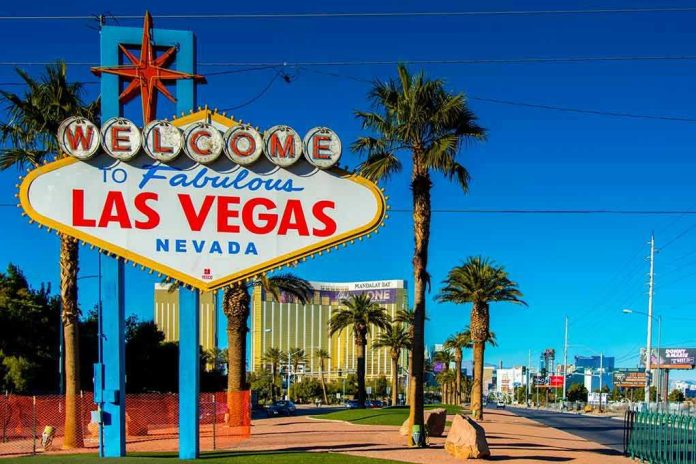
The most unexpected casino deal in recent Vegas history just unfolded—seven Nevada casinos, including a Strip icon, quietly traded hands for $1.16 billion, and almost no one noticed until it was too late.
Story Snapshot
- VICI Properties, a real estate investment trust, acquires seven Nevada casinos from Golden Entertainment for $1.16 billion in a sale-leaseback deal.
- The transaction includes The STRAT Hotel, Casino & Tower on the Las Vegas Strip, plus six other properties in the locals, Laughlin, and Pahrump markets.
- Golden Entertainment transitions to private ownership, with CEO Blake L. Sartini’s new entity leasing the casinos back for 30 years (with options), keeping operational control.
- The deal reflects a broader industry shift: separating casino real estate ownership from operations to unlock value and flexibility.
- Nearly 6,000 hotel rooms, 4,300 slot machines, and hundreds of jobs remain under Golden’s management, but the real estate now belongs to VICI.
How the Deal Went Down
In early November 2025, VICI Properties announced it had agreed to buy the real estate assets of seven casinos from Golden Entertainment, a move that instantly reshapes Nevada’s gaming landscape. The properties span the Las Vegas Strip, local Vegas neighborhoods, Laughlin, and Pahrump, but the headline grabber is The STRAT—a North Strip landmark with a history as tall as its tower. The $1.16 billion price tag is eye-popping, but the real story is the structure: Golden Entertainment isn’t walking away. Instead, it’s leasing the casinos right back under a 30-year triple-net master lease with 2% annual rent increases, starting in year three.
Famous Las Vegas Strip casino sold in unexpected $1.16 billion deal https://t.co/s5z2VSwLRs pic.twitter.com/tDsEAp0Zyx
— Energy News Today (@ENRGYnewstoday) November 8, 2025
For VICI, this is a playbook move—acquire gaming real estate, secure long-term lease revenue, and let the operator run the business. For Golden, it’s a lifeline: the company’s stock had plummeted 31% year-to-date, and this deal unlocks cash from undervalued real estate while keeping the lights on and the dice rolling. Golden’s transition to private ownership, with Sartini at the helm of the new leaseholder, signals a bet that the company’s best days are ahead—away from the volatility of public markets.
What’s Really at Stake
This transaction isn’t just about shuffling deeds and dollars. It’s a reflection of seismic shifts in the casino business, where real estate investment trusts like VICI are becoming the silent landlords of the Strip and beyond. The model is simple: operators like Golden Entertainment focus on running casinos, while REITs like VICI collect rent and enjoy stable, inflation-protected returns. It’s a win-win on paper, but the real test is whether this structure can weather economic downturns, shifting consumer tastes, and the relentless pressure to innovate in a city that never sleeps.
The deal’s terms tell the tale. VICI gets a 7.5% initial yield on its $87 million annual rent, with built-in escalations—music to the ears of income-focused investors. Golden, meanwhile, keeps control of operations, but now must generate enough profit to cover the rent and then some. The arrangement is common in retail and healthcare real estate, but in gaming, it’s a sign of maturity—and perhaps, of necessity, as operators seek to unlock value from their bricks and mortar without losing the golden goose.
Who Wins, Who Watches
Golden Entertainment shareholders get liquidity and an exit from a stock that’s been bleeding value. VICI’s investors gain exposure to a diversified portfolio of Nevada gaming properties, with predictable cash flows and a long lease runway. Casino employees, at least in the near term, see business as usual—same bosses, same jobs, same paychecks. The communities around these properties—Las Vegas, Laughlin, Pahrump—keep their economic engines humming, at least for now.
But there’s a deeper question: What does this mean for the soul of Las Vegas? The Strip has always been a place where fortunes are made and lost, where operators put their names on the marquee and their reputations on the line every night. With REITs as landlords, the calculus changes. The pressure to perform is still there, but the stakes are different. Operators must satisfy both customers and a new class of investors who care less about comps and cocktails and more about cap rates and escalations.
The Bigger Picture
This deal is a microcosm of a national trend. Across industries, companies are separating real estate ownership from operations to unlock capital and focus on what they do best. In gaming, this trend is accelerating, driven by the unique economics of casino properties—high fixed costs, steady cash flows, and the need for constant reinvestment. VICI’s growing empire, which now includes some of the most recognizable names on and off the Strip, is proof that the model works—at least for now.
But nothing in Vegas is forever. The city thrives on reinvention, and the next chapter may see even more creative deal structures, or a backlash against the financialization of the casino floor. For now, though, the chips are down: real estate is one game, operations another, and the house—whether it’s VICI or Golden—always has an edge.
Property Portfolio: The Seven Casinos
The deal includes The STRAT Hotel, Casino & Tower (North Las Vegas Strip), Arizona Charlie’s Decatur and Boulder (Las Vegas locals market), Aquarius Casino Resort and Edgewater Casino Resort (Laughlin), and Pahrump Nugget Hotel & Casino plus Lakeside RV Park & Casino (Pahrump)[1][2]. Together, they represent 362,000 square feet of casino space, over 6,000 hotel rooms, 4,306 slot machines, and 78 table games—a formidable footprint in Nevada’s gaming economy.
Financials: The Fine Print
VICI pays $1.16 billion for the real estate, with Golden leasing it back at $87 million per year initially—a 7.5% cap rate. The lease runs for 30 years, with four 5-year renewal options and 2% annual rent increases starting in year three. Golden’s recent financials show $649.9 million in revenue and $133.6 million in EBITDA over the last twelve months, but a 31% stock drop year-to-date before the deal.
What Comes Next
The transaction is pending standard closing conditions, but no regulatory hurdles are expected. For VICI, it’s business as usual—more properties, more rent, more growth. For Golden, it’s a chance to reset, away from the glare of Wall Street, with a clean balance sheet and a long-term lease. For Las Vegas, it’s another reminder that even in a town built on spectacle, the most consequential deals often happen behind closed doors.
Sources:
Investing.com: VICI Properties to Acquire 7 Nevada Casinos for $1.16 Billion
Connect CRE: VICI Pays $1.16B for 7 Nevada Casinos
Casino.org: Golden Entertainment Going Private, VICI Buying Three More Vegas Casinos
YogoNet: Golden Entertainment Goes Private, Signs $1.16 Billion Sale-Leaseback Deal with VICI




